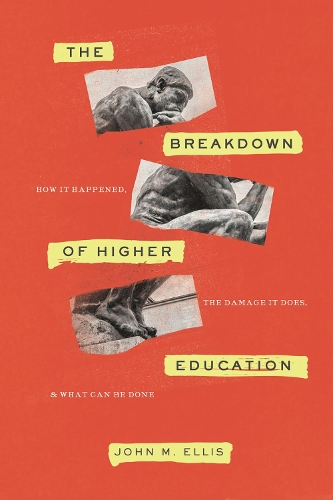
The Breakdown of Higher Education: How It Happened, the Damage It Does, and What Can Be Done
(Paperback)
Available Formats
Publishing Details
The Breakdown of Higher Education: How It Happened, the Damage It Does, and What Can Be Done
By (Author) John M. Ellis
Encounter Books,USA
Encounter Books,USA
16th November 2021
United States
Classifications
General
Non Fiction
Educational administration and organization
Educational strategies and policy
Philosophy and theory of education
378.73
Physical Properties
Paperback
240
Width 152mm, Height 228mm
Description
A series of near-riots on campuses aimed at silencing guest speakers has exposed the fact that our universities are no longer devoted to the free exchange of ideas in pursuit of truth. But this hostility to free speech is only a symptom of a deeper problem, writes John Ellis.
Having watched the deterioration of academia up close for the past fifty years, Ellis locates the core of the problem in a change in the composition of the faculty during this time, from mildly left-leaning to almost exclusively leftist. He explains how astonishing historical luck led to the success of a plan first devised by a small group of activists to use college campuses to promote radical politics, and why laws and regulations designed to prevent the politicizing of higher education proved insufficient.
Ellis shows that political motivation is always destructive of higher learning. Even science and technology departments are not immune. The corruption of universities by radical politics also does wider damage: to primary and secondary education, to race relations, to preparation for the workplace, and to the political and social fabric of the nation. Commonly suggested remediesnew free-speech rules, or enforced right-of-center appointmentswill fail because they dont touch the core problem, a controlling faculty majority of political activists with no real interest in scholarship. This book proposes more drastic and effective reform measures. The first step is for Americans to recognize that vast sums of public money intended for education are being diverted to a political agenda, and to demand that this fraud be stopped.
Reviews
In the old Soviet Union, you could get arrested for saying there was no freedom of speech. By the same token, John Elliss clear, well-presented, and relentless new critique of higher education demands real answers, but it will probably be unfairly vilifiedwhich is precisely Elliss point.
Gary Saul Morson, the Lawrence B. Dumas Professor of the Arts and Humanities at Northwestern University
There are few writers as knowledgeable and clear-eyed about the precipitous and dangerous decline of American universities as John Ellis. Everyone who cares about the future of our country should read this book.
David Horowitz, author of Reforming Our Universities
Americas public universities are engaged in large-scale theft, observes John Ellis trenchantly: they fraudulently divert funds appropriated for education to the improper purpose of political indoctrination. Private colleges are no less deceptive about their activities, holding themselves out as disinterested purveyors of skills and knowledge while inculcating in students a hatred of Enlightenment values and the American project. Ellis plumbs the history that corrupted the countrys once peerless colleges and universities and proposes a radical but necessary plan of action to restore education to its central role in preserving our precious civilization.
Heather Mac Donald, the Thomas W. Smith Fellow at the Manhattan Institute and author of The Diversity Delusion
In this deeply researched and devastating indictment, John M. Ellis contends that decades of radicalization have turned Americas once-great universities into a monoculture of authoritarian leftist orthodoxy. The left-right ratio among faculty is now nearly 12 to 1, with most professors far to the left of ordinary liberals. Conservative voices are openly disdained and often suppressed as campus ideology becomes ever more extreme, and tribalist identity politics holds priority over academic excellence. Administrators and trustees, says Ellis, are too cowardly or too complicit to stand up for apolitical scholarship and teaching. Many students are afraid to express their opinions, and they spend far less time studying than in the past. One might hope that Ellis exaggerates in calling the state of higher education a national crisis of vast proportions, but the evidence he musters is too potent to be dismissed.
Stuart Taylor, Jr., coauthor (with KC Johnson) of The Campus Rape Frenzy: The Attack on Due Process at Americas Universities
Author Bio
John M. Ellis is Distinguished Professor Emeritus of German Literature at the University of California, Santa Cruz. He taught at universities in England, Wales, and Canada before joining UCSC in 1966, serving as dean of the Graduate Division in 197786. He is the author of ten books, including Literature Lost (Yale), awarded the Peter Shaw Memorial Award by the National Association of Scholars. He founded the Association of Literary Scholars and Critics in 1993, and served as president of the California Association of Scholars in 200713 and chairman of its board since then. His articles on education reform have appeared in prominent national publications.
